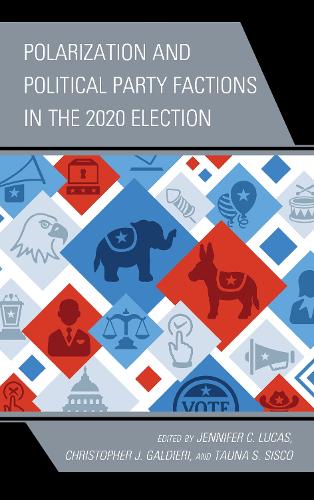
Polarization and Political Party Factions in the 2020 Election
(Hardback)
Publishing Details
Polarization and Political Party Factions in the 2020 Election
By (Author) Jennifer C. Lucas
Edited by Christopher J. Galdieri
Contributions by Zachary Albert
Contributions by Brian K. Arbour
Contributions by Kevin K. Banda
Contributions by Todd L. Belt
Contributions by Robert G. Boatright
Contributions by Mark D. Brewer
Contributions by Christopher Chapp
Contributions by John Cluverius
Bloomsbury Publishing PLC
Lexington Books/Fortress Academic
13th April 2022
United States
Classifications
Professional and Scholarly
Non Fiction
Political campaigning and advertising
Social theory
324.60973
Physical Properties
Hardback
236
Width 161mm, Height 227mm, Spine 21mm
544g
Description
This volume explores the conflict between two forces: party polarization and party factionalism. The major change in Americas two political parties over the past half-century has been increased polarization, which has led to a new era of heightened inter-party competition resulting in stronger and more cohesive parties. At the same time, elections, particularly primaries, often reveal deep internal factional divisions within both the parties, and the 2020 election was no different. The Democratic coalition typically pits moderate or establishment candidates against progressive activists and candidates, while the Republican Party in 2020 was, at times, polarized not only between moderates and conservatives but between those willing to criticize President Trump and those who would not. How did these two opposing forces shape the outcome of the 2020 election, and what are the consequences for the future of American party politics and elections
Reviews
This timely volume is a must read for students of both parties and elections. With contributions from some of the most respected scholars in the field, Polarization and Political Party Factions in the 2020 Election explores the nuances of both party competition and intraparty conflict in the U.S. In doing so, the book dissects important developments across the political landscape, including those pertaining to presidential and congressional primaries, online activism, access to the polls, campaign finance, ideological identities, and much more. The authors help make sense of a turbulent time in American politics, while also preparing readers for the issues and debates likely to dominate in the coming years.
-- Elliott Fullmer, Randolph-Macon CollegeLucas, Galdieri, and Sisco have assembled a talented and creative group of scholars to address some of the most pressing questions about the 2020 election cycle. This book offers valuable new research on factional struggles within the major American political parties from the on-line progressives seeking to pull the Democrats leftward to the Lincoln Project working to dislodge Trump from the GOP. The volume covers the impact of primaries, the challenges of polling, the struggles of election administration, and more. Students, scholars, and political observers will find a great many answers in these pages, along with creative suggestions for further inquiry.
-- Seth Masket, University of DenverAuthor Bio
Jennifer C. Lucas is professor of politics and Chair of the Department of Politics at Saint Anselm College.
Christopher J. Galdieri is associate professor of politics at Saint Anselm College.
Tauna S. Sisco is professor of sociology and Chair of the Department of Sociology and Social Work at Saint Anselm College.
